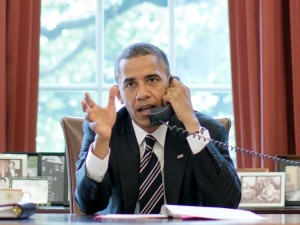 President�Barack Obama�should �stop apologizing� for the National Security Agency�s telephone-surveillance program that has �saved thousands of lives,� according to Republican U.S. Representative�Peter King.
President�Barack Obama�should �stop apologizing� for the National Security Agency�s telephone-surveillance program that has �saved thousands of lives,� according to Republican U.S. Representative�Peter King.Disclosures of the extent of the NSA phone-monitoring have upset politicians from Brasilia to Berlin. European Union leaders said last week they would seek a trans-Atlantic accord on espionage after Der Spiegel magazine reported the NSA targeted German Chancellor�Angela Merkel�s mobile phone and Le Monde newspaper said the agency collected telecommunications data in�France.
�The president should stop apologizing, stop being defensive,� King, a lawmaker from�New York, said yesterday on NBC�s �Meet the Press� program. �The reality is the NSA has saved thousands of lives -- not just in the�United States�but also in France and�Germany�and throughout�Europe.�
The NSA program gathers �valuable intelligence which helps not just us but also helps the Europeans,� King said.
The NSA operations have also prompted some Europeans to call for a suspension of talks for a free-trade zone between the European Union and the U.S., while German�Chancellor Merkel, whose country is export-oriented, has rejected those calls.
Obama�s Apology
Obama apologized to Merkel in a telephone exchange Oct. 23 and said that he would have stopped the alleged spying had he known about it, Spiegel magazine reported, citing unidentified chancellery officials.
Speaking on CNN�s �State of the Union� program, Republican Representative Mike Rogers of Michigan, chairman of the House Intelligence Committee, said �the bigger news story� would be �if the United States intelligence services weren�t trying to collect information that would protect U.S. interests both home and abroad.�
�We should collect information that�s helpful to the United States� interests,� Rogers said.
The Michigan lawmaker also said that recent friction with�Saudi Arabia��has been developing over the last two years.� He cited what he said was a U.S. decision two years ago to stay away from the Syrian conflict and the recent �quick rush to the sweet talk� from Iran on that country�s nuclear program.
�Those are critical issues to the Saudis, to the Qataris, to the Jordanians, to others in the�Arab League�that I think rattled their faith in the administration�s ability to protect them in a very dangerous world,� Rogers said.
Security Council
Saudi Arabia refused to accept the membership of the�United Nations Security Council�it won earlier this month, citing issues including Syria�s civil war that it said show the world body is incapable of resolving conflicts.
The council�s �style, working mechanisms and double standards� prevent it from ending the turmoil in Syria and the Israeli-Palestinian conflict, the Saudi Foreign Ministry said in a statement on the state-run Saudi Press Agency. The body has also failed to rid the Middle East of weapons of mass destruction and nuclear arms programs, it said.
Speaking on ABC�s �This Week,� former Republican Vice President�Dick Cheney�also was critical of Democrat Obama�s policies, saying the Middle East no longer has confidence in the U.S., whereas its presence in the region was �enormously important� for decades.
�Significantly Diminished�
�If we�re not heavily involved there, if we�ve turned our back on the region, if we�ve had a president who believes we overreacted to the terrorism attacks on 9/11, I think the Saudis, the Emirates, the Egyptians, many in that part of the world no longer have confidence in the United States,� Cheney said on the television program.
U.S. presence, capability and influence �has been significantly diminished� as the nation has withdrawn from the region and cut the number of forces there, Cheney said. �Our friends no longer count on us, no longer trust us, and our adversaries don�t fear us. That was sort of the cornerstone and the basis of the U.S. ability and influence.�
Cheney said he didn�t have a lot of confidence in the ability of the Obama administration to negotiate an agreement with Iran over its nuclear program, a skepticism he said is shared by officials in the�Middle East.
�They�re very fearful that the whole Iranian exercise is going to go the same way as the Syrian exercise, that is, that there will be bold talk from the administration,� Cheney said. �But in the final analysis, nothing effective will be done about the Iranian program.�
In response to a question on whether military action against Iran was inevitable, Cheney said �I have trouble seeing how we�re going to achieve our objective short of that.�
By Bloomberg
The Iran Project is not responsible for the content of quoted articles.










